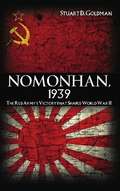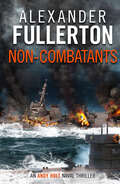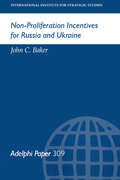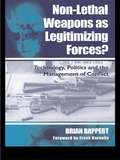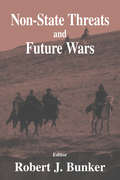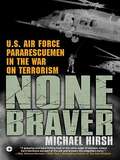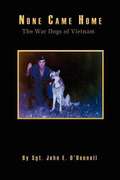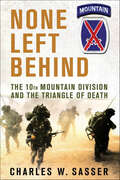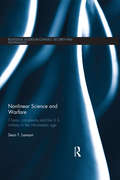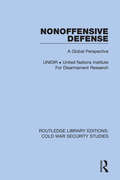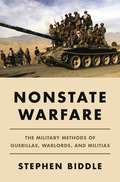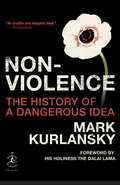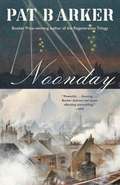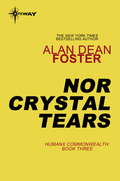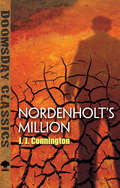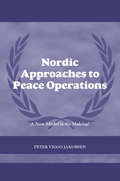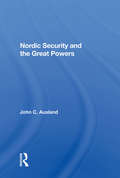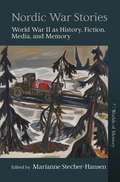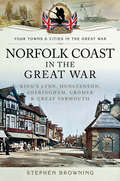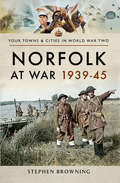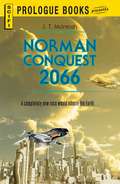- Table View
- List View
Nomonhan, 1939
by Stuart D. GoldmanThis is the story of a little-known Soviet-Japanese conflict that influenced the outbreak and shaped the course of the Second World War. In the summers of 1937, 1938, and 1939, Japan and the Soviet Union fought a series of border conflicts. The first was on the Amur River days before the outbreak of the 2nd Sino-Japanese War. In 1938, division-strength units fought a bloody 2-week battle at Changkufeng near the Korea-Manchuria-Soviet border. The Nomonhan conflict (May-September 1939) on the Manchurian-Mongolian frontier, was a small undeclared war, with over 100,000 troops, 500 tanks and aircraft, and 30,000-50,000 killed and wounded. In the climactic battle, August 20-31, the Japanese were annihilated. This coincided precisely with the conclusion of the German-Soviet Nonaggression Pact (August 23, 1939) - the green light to Hitler's invasion of Poland and the outbreak of WW II one week later. These events are connected. This book relates these developments and weaves them together.From May through July 1939, the conflict was provoked and escalated by the Japanese, whose assaults were repulsed by the Red Army. In August, Stalin unleashed a simultaneous military and diplomatic counter strike. Zhukov, the Soviet commander, launched an offensive that crushed the Japanese. At the same time, Stalin concluded an alliance with Hitler, Japan's nominal ally, leaving Tokyo diplomatically isolated and militarily humiliated.The fact that these events coincided was no "coincidence." Europe was sliding toward war as Hitler prepared to attack Poland. Stalin sought to avoid a two-front war against Germany and Japan. His ideal outcome would be for the fascist/militarist capitalists (Germany, Italy, and Japan) to fight the bourgeois/democratic capitalists (Britain, France, and perhaps the United States), leaving the Soviet Union on the sidelines while the capitalists exhausted themselves. The Nazi-Soviet Pact pitted Germany against Britain and France and allowed Stalin to deal decisively with an isolated Japan, which he did at Nomonhan.Zhukov won his spurs at Nomonhan and won Stalin's confidence to entrust him with the high command in 1941, when he halted the Germans at the gates of Moscow with reinforcements from the Soviet Far East. The Far Eastern reserves were deployed westward in the autumn of 1941 when Moscow learned that Japan would not attack the Soviet Far East, because it decided to expand southward to seize the oil-rich Dutch East Indies, which led them to attack Pearl Harbor.The notorious Japanese officer, TSUJI Masanobu, who played a central role at Nomonhan, was an important figure in the decision to attack Pearl Harbor. In 1941, Col. Tsuji was a staff officer at Imperial General HQ. Because of the U.S. oil embargo on Japan, the Imperial Navy wanted to seize the Dutch East Indies. Only the U.S. Pacific Fleet stood in the way. Some army leaders, however, wanted to attack the U.S.S.R., avenging the defeat at Nomonhan while the Red Army was being smashed by the German blitzkreig. Tsuji, an influencial leader, backed the Navy position that led to Pearl Harbor. According to senior Japanese officials, Tsuji was the most influential Army advocate of war with the United States. Tsuji later wrote that his experience of Soviet fire-power at Nomonhan convinced him not to take on the Russians in 1941
Non-Combatants (The Andy Holt Naval Thrillers)
by Alexander FullertonA young merchant marine embarks on a deadly voyage across the Atlantic in this WWII naval thriller.Summer 1940. Merchant Marine Andy Holt is second mate on the SS Barranquilla, sailing from the Clyde to Cuba. With a pregnant sweetheart waiting at home, he hopes to make it back in time to get married and welcome their child into the world. But odds are against any individual ship getting over the pond and back. There have been heavy losses off Norway and Dunkirk. Now the vital priority is for escorting destroyers to counter the invasion threat. Though the outward journey may be perilous, it&’s the homeward trip where the real danger lies: U-boats prefer their victims deep-laden and full of cargo.
Non-International Armed Conflicts in International Law
by Yoram DinsteinThis dispassionate analysis of the legal implications of non-international armed conflicts explores the rules regulating the conduct of internal hostilities, as well as the consequences of intervention by foreign States, the role of the Security Council, the effects of recognition, State responsibility for wrongdoing by both Governments and insurgents, the interface with the law of human rights and the notion of war crimes. The author addresses both conceptual and specific issues, such as the complexities of 'failing' States or the recruitment and use of child soldiers. He makes use of the extensive case law of international courts and tribunals, in order to identify and set out customary international law. Much attention is also given to the contents of available treaty texts (primarily, the Geneva Conventions, Additional Protocol II and the Rome Statute of the International Criminal Court): what they contain and what they omit.
Non-Legality in International Law
by Fleur JohnsInternational lawyers typically start with the legal. What is a legal as opposed to a political question? How should international law adapt to the unforeseen? These are the routes by which international lawyers typically reason. This book begins, instead, with the non-legal. In a series of case studies, Fleur Johns examines what international lawyers cast outside or against law - as extra-legal, illegal, pre-legal or otherwise non-legal - and how this comes to shape political possibility. Non-legality is not merely the remainder of regulatory action. It is a key structuring device of contemporary global order. Constructions of non-legality are pivotal to debate in areas ranging from torture to foreign investment and from climate change to natural disaster relief. Understandings of non-legality inform what international lawyers today do and what they refrain from doing. Tracing and potentially reimagining the non-legal in international legal work is, accordingly, both vital and pressing.
Non-Proliferation Incentives for Russia and Ukraine (Adelphi series #309)
by John C BakerGiven their protracted economic difficulties, the nuclear and aerospace industries in Russia and Ukraine are tempted to export dual-use technologies that can contribute to the proliferation of weapons of mass destruction and missile systems. John C. Baker proposes using international incentives to discourage irresponsible export behaviour while seeking long-term changes in the non-proliferation attitudes of their managers and government leaders.
Non-lethal Weapons as Legitimising Forces?: Technology, Politics and the Management of Conflict
by Brian RappertAs mankind finds ever more impious ways to kill and maim, some look to non-lethal weapons as a fix. Brian Rappert discusses the technologies involved and the ethics of, for example blinding someone with a laser, leaving them blind forever, versus killing them outright.
Non-state Threats and Future Wars
by Robert J. BunkerThe intent behind this book was to bring together a team of defence and national security scholars and real-world military and law enforcement operators to focus on the topic of "Non-State Threats and Future Wars". The book is divided into four main sections: The first concerns theory. The second section concerns non-state threats and case studies, providing an overview of non-state threats ranging from organized crime networks to cartels, gangs and warlords. The third section is based on counter-OPFOR (opposing force) strategies which detail advanced concepts, urban battlespace environmental perceptions, weaponry, intelligence preparation, networked force structure and C41. The fourth and final section contains an archival document from the late 1987 period concerning early Fourth Epoch War theory, and never before published interviews with Chechen commanders and officers who participated in combat operations against Russian forces in the 1994-96 war.
None Braver
by Michael HirshFrom award-winning journalist and combat veteran Michael Hirsh comes the thrilling inside story of the Air Force's pararescue operations in Afghanistan. The first journalist to be embedded with an Air Force combat unit in the war on terrorism, Hirsh flew from Moody Air Force Base, Georgia, with the 71st Rescue Squadron to their expeditionary headquarters at a secret location in Central Asia. Unparalleled access to the pararescue jumpers-or PJs-as well as to the courageous men and women who fly them where they have to go, often under enemy fire, allowed Michael Hirsh to uncover incredible stories of courage. Among them: the drama of a plane crash at 10,000 feet in the Hindu Kush mountains, where PJs climb with hundred-pound packs through chest-deep snow to rescue the crew; the tension of an unprecedented nighttime combat parachute jump into the middle of an Afghan minefield; the heartbreak during Operation Anaconda, when seven American fighting men die, including the first PJ killed in combat since Vietnam.
None Came Home: The War Dogs Of Vietnam
by John E. O'DonnellAutobiography of a Vietnam soldier who joins the K-9 corps and is teamed with German Shepherd named King. He writes about the training for K-9, many of their experiences, and a small group's attempts to smuggle their dogs home. [Note: There were numerous errors in the print edition which had to be left due to copyright laws.]
None Left Behind: The 10th Mountain Division and the Triangle of Death
by Charles W. SasserA devastating ambush in Iraq, kidnapped soldiers, and the men who wouldn't leave their comrades behindThe 10th Mountain Division is known as the most deployed unit in the U.S. Army. Today, the War on Terror has drawn it to Afghanistan and Iraq. To Lieutenant Colonel Mike Infanti's unit fell the pacification of a hellish hotbed of terrorism south of Baghdad dubbed "The Triangle of Death." Of the more than three thousand Americans killed since the start of the war, more than one thousand were in this region.Colonel Infanti assigned Delta Company to the most dangerous sector of the Triangle. Delta knew they were virtually assured of getting hit on a daily basis. Each day and night became something to be dreaded and feared.In the predawn of May 12, 2007, two humvees occupied by seven soldiers and an Iraqi translator were ambushed by insurgents. When the smoke cleared, four soldiers and the translator were dead and three were missing, presumably seized by the enemy. For more than a year, Delta searched for their missing comrades, never giving up hope. Their creed of battle: None Left Behind.
Nonlinear Science and Warfare: Chaos, complexity and the U.S. military in the information age (Routledge Studies in Conflict, Security and Technology)
by Sean T. LawsonThis book examines the United States military’s use of concepts from non-linear science, such as chaos and complexity theory, in its efforts to theorise information-age warfare. Over the past three decades, the US defence community has shown an increasing interest in learning lessons from the non-linear sciences. Theories, strategies, and doctrines of warfare that have guided the conduct of US forces in recent conflicts have been substantially influenced by ideas borrowed from non-linear science, including manoeuvre warfare, network-centric warfare, and counterinsurgency. This book accounts for the uses that the US military has made of non-linear science by examining the long-standing historical relationship between the natural sciences and Western militaries. It identifies concepts and metaphors borrowed from natural science as a key formative factor behind the development of military theory, strategy, and doctrine. In doing so, Nonlinear Science and Warfare not only improves our understanding of the relationship between military professional identity, professional military education, and changes in technology, but also provides important insights into the evolving nature of conflict in the Information Age. This book will be of much interest to students of strategic studies, military science, US foreign policy, technology and war, and security studies.
Nonoffensive Defense: A Global Perspective (Routledge Library Editions: Cold War Security Studies #33)
by Unidir United Nations Institute For Disarmament ResearchThis book, first published in 1990, examines the theories on ‘nonoffensive’ or ‘nonprovocative’ defence that arose at the end of the Cold War. The debate around the theories is analysed here, including the claims that nonoffensive defence would lead to conventional stability, security at lower levels of armaments, and reduce suspicion leading to peace and stability.
Nonstate Warfare: The Military Methods of Guerillas, Warlords, and Militias
by Stephen BiddleHow nonstate military strategies overturn traditional perspectives on warfareSince September 11th, 2001, armed nonstate actors have received increased attention and discussion from scholars, policymakers, and the military. Underlying debates about nonstate warfare and how it should be countered is one crucial assumption: that state and nonstate actors fight very differently. In Nonstate Warfare, Stephen Biddle upturns this distinction, arguing that there is actually nothing intrinsic separating state or nonstate military behavior. Through an in-depth look at nonstate military conduct, Biddle shows that many nonstate armies now fight more "conventionally" than many state armies, and that the internal politics of nonstate actors—their institutional maturity and wartime stakes rather than their material weapons or equipment—determines tactics and strategies.Biddle frames nonstate and state methods along a continuum, spanning Fabian-style irregular warfare to Napoleonic-style warfare involving massed armies, and he presents a systematic theory to explain any given nonstate actor’s position on this spectrum. Showing that most warfare for at least a century has kept to the blended middle of the spectrum, Biddle argues that material and tribal culture explanations for nonstate warfare methods do not adequately explain observed patterns of warmaking. Investigating a range of historical examples from Lebanon and Iraq to Somalia, Croatia, and the Vietcong, Biddle demonstrates that viewing state and nonstate warfighting as mutually exclusive can lead to errors in policy and scholarship.A comprehensive account of combat methods and military rationale, Nonstate Warfare offers a new understanding for wartime military behavior.
Nonviolence: The History of a Dangerous Idea
by Mark KurlanskyIn this timely, highly original, and controversial narrative, New York Times bestselling author Mark Kurlansky discusses nonviolence as a distinct entity, a course of action, rather than a mere state of mind. Nonviolence can and should be a technique for overcoming social injustice and ending wars, he asserts, which is why it is the preferred method of those who speak truth to power. Nonviolence is a sweeping yet concise history that moves from ancient Hindu times to present-day conflicts raging in the Middle East and elsewhere. Kurlansky also brings into focus just why nonviolence is a "dangerous" idea, and asks such provocative questions as: Is there such a thing as a "just war"? Could nonviolence have worked against even the most evil regimes in history?Kurlansky draws from history twenty-five provocative lessons on the subject that we can use to effect change today. He shows how, time and again, violence is used to suppress nonviolence and its practitioners-Gandhi and Martin Luther King, for example; that the stated deterrence value of standing national armies and huge weapons arsenals is, at best, negligible; and, encouragingly, that much of the hard work necessary to begin a movement to end war is already complete. It simply needs to be embraced and accelerated.Engaging, scholarly, and brilliantly reasoned, Nonviolence is a work that compels readers to look at history in an entirely new way. This is not just a manifesto for our times but a trailblazing book whose time has come.From the Hardcover edition.
Noonday: A Novel (Life Class Trilogy #3)
by Pat BarkerA new novel from the Booker Prize winning Pat Barker, author of the Regeneration Trilogy, that unforgettably portrays London during the Blitz (her first portrayal of World War II) and reconfirms her place in the very top rank of British novelists.London, the Blitz, Autumn 1940. As the bombs fall on the blacked-out city, ambulance driver Elinor Brooke races from bomb sites to hospitals trying to save the lives of injured survivors, working alongside former friend Kit Neville, while her husband Paul Tarrant works as an air-raide warden. Once fellow students at the Slade School of Fine Art before the First World War destroyed the hopes of their generation, they now find themselves caught in another war, this time at home. As the bombing intensifies, the constant risk of death makes all three reach out for quick consolation. And into their midst comes the spirit medium Bertha Mason, grotesque and unforgettable, whose ability to make contact with the deceased finds vastly increased demands as death rains down from the skies. Old loves and obsessions resurface until Elinor is brought face to face with an almost impossible choice. Completing the story of Elinor Brooke, Paul Tarrant and Kit Neville begun with Life Class and continued with Toby's Room, Noonday is both a stand-alone novel and the climax of a trilogy. Writing about the Second World War for the first time, Pat Barker brings the besieged and haunted city of London into electrifying life in her most powerful novel since the Regeneration trilogy.
Nor Crystal Tears
by Alan Dean FosterIn the beginning, before Man and the insect Thranx became allies, in the days when the reptilian AAnn were just occasional raiders of the Thranx colony worlds, one young Thranx agricultural expert lived a life of quiet desperation. A dreamer in a world of sensible well adjusted socialised beings, Ryo buried himself in his work of reclaiming marshland until... Until he met the Aliens. Grotesque two legged creatures, unpleasingly soft skinned, gross in their appetites, alarming in their movements, all in all pretty revolting species, yet his curiosity overcame his queasiness and he befriended them. And discovered they were called Man.
Nordenholt's Million (Dover Doomsday Classics)
by J. J. ConningtonFamine sweeps across the world when a lab accident unleashes a virulent strain of bacteria that transforms healthy fields into barren wastelands. With the fate of the human race at stake, wealthy financier Stanley Nordenholt establishes a stronghold in central Scotland and assumes dictatorial powers to save what remains of the planet's starving population. This gripping tale of survival explores some of the moral dilemmas that arise in the wake of catastrophic events as well as their social, cultural, and political consequences. A precursor to the latter-day tales from the golden age of science fiction, this compelling novel was published by a noted British chemist in 1923. Acclaimed by the Encyclopedia of Science Fiction as "realistic, reasoned, sociologically observed, and credible," it offers an ever-relevant warning against the exploitation of disaster as a pretext for the suspension of freedom, democracy, and justice.
Nordic Approaches to Peace Operations: A New Model in the Making (Cass Series On Peacekeeping Ser. #Vol. 22)
by Peter Viggo JakobsenA new examination of Nordic approaches to peace operations after the Cold War. It shows how the Nordic countries (Denmark, Finland, Norway and Sweden) remain relevant for the study and practice of post-Cold War peace operations.This unique study is structured around eleven success conditions derived from an analysis of the lessons learned
Nordic Security And The Great Powers
by John C. AuslandThis book contains a remarkable amount of information about Soviet intelligence activities. It includes a partial list of Soviet agents which the Nordic countries expelled after 1970 and discusses the security policies of these countries.
Nordic War Stories: World War II as History, Fiction, Media, and Memory (Worlds of Memory #7)
by Marianne Stecher-HansenSituated on Europe’s northern periphery, Denmark, Finland, Iceland, Norway, and Sweden found themselves caught between warring powers during World War II. Ultimately, these nations survived the conflict as sovereign states whose wartime experiences have profoundly shaped their historiography, literature, cinema and memory cultures. Nordic War Stories explores the commonalities and divergences among the five Nordic countries, examining national historiographies alongside representations of the war years in canonical literary works, travel writing, and film media. Together, they comprise a valuable companion that challenges the myth of Scandinavian homogeneity while demonstrating the powerful influence that the war continues to exert on national identities.
Nordic War Stories: World War II as History, Fiction, Media, and Memory (Worlds of Memory #7)
by Marianne Stecher-HansenSituated on Europe’s northern periphery, Denmark, Finland, Iceland, Norway, and Sweden found themselves caught between warring powers during World War II. Ultimately, these nations survived the conflict as sovereign states whose wartime experiences have profoundly shaped their historiography, literature, cinema and memory cultures. Nordic War Stories explores the commonalities and divergences among the five Nordic countries, examining national historiographies alongside representations of the war years in canonical literary works, travel writing, and film media. Together, they comprise a valuable companion that challenges the myth of Scandinavian homogeneity while demonstrating the powerful influence that the war continues to exert on national identities.
Nordicism and Modernity
by Gregers Einer ForsslingThis book offers a complete narrative of the development of Nordicism, from its roots in the National Romantic movement of the late eighteenth century, through to its most notorious manifestation in Nazi Germany, and finally to the fragmented forms that still remain in contemporary society. It is distinctive in treating Nordicism as a phenomenon with its own narrative, rather than as discreet episodes in works studying aspects of Eugenics, Nationalism, Nazism and the reception history of Old Norse culture. It is also distinctive in applying to this narrative a framework of analysis derived from the parallel theories of Roger Griffin and Zygmunt Bauman, to examine Nordicism as a process of myth creation protecting both the individual and society from the challenges and terror of an ever-changing and accelerating state of modernity.
Norfolk Coast in the Great War: King's Lynn, Hunstanton, Sheringham, Cromer and Great Yarmouth (Your Towns & Cities in the Great War)
by Stephen BrowningNorfolk Coast in the Great War focuses on the trials and joys, the achievements and disappointments, the humor and the sadness of everyday life in a region living on the edge of the country at the heart of the Kings vast Empire. Everyone from the folk who went off to fight, to scouts and schoolchildren, had a role to play in this coastline that had, since the time of the Spanish Armada, been considered a likely place for an enemy invasion. There were days of great tension, even terror, such as on the day of the first bombardment of the coast by the German Navy, and the day of Zeppelin attacks and dog fights out to sea when the flimsy planes of a fledgling RAF took on the Red Baron and his comrades.This unique study is based largely on original archive material, much of it never before published in book form. It is accompanied by many rare and fascinating photographs that show the day-to-day life of the people who lived in the many settlements on the coast and just inland. In addition, this book also gives an itinerary for a walk along the 46 mile stretch of the coast from Hunstanton to Cromer, taking in many of the places discussed and giving views that are exactly the same as they were 100 years ago.
Norfolk at War, 1939–45 (Your Towns And Cities In World War Two Ser.)
by Stephen BrowningThis year-on-year study of Norfolk at war is the first such for many years, which utilizes material that has not been published in book form before or, sometimes, at all. In both the First and Second World War, Norfolk was pivotal, albeit for different reasons. During the war of 1939-45 Norfolk was home to many bases of the USAAF, changing the area forever with bases remaining a fond feature of Norfolk life. Another unique and enduring legacy was the arrival and often permanent settlement of many Poles, who are commemorated today by a shrine in the Cathedral of St John the Baptist in Norwich. Norfolk was in many ways changed forever as it had largely, up until this time, been proudly, even stubbornly, isolated a feature that could not have changed more dramatically. This study is both inevitably a military and social study. The major events both at home and overseas are laid out, together with a description of how home life unfolded in very dark times when the stoicism and humor of the Norfolk residents were tested. Contemporary material from newspapers, diaries and local records, as well as over 200 photographs, are used to bring life and color and life to the account.
Norman Conquest 2066
by J. T. McintoshA new race would inherit the Earth.Tormented by neuroses, psychoses, and instability, mankind changed, and two new breeds of humans were born:Normans - devoid of body hair, quiet, rational, hiding a strange new power. And Sexons - wild, animalistic, with lustful urges.And each one was convinced it was Earth’s true heir.
